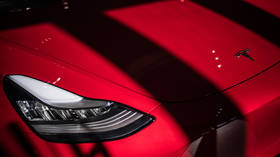Tesla secretly excluded steering components in some cars – reports

Tesla decided to remove one of the two electronic control units included in the steering racks of some of its Model 3 and Model Y cars, CNBC reported on Monday, citing its sources. The move was explained as a way of meeting fourth-quarter sales goals while coping with the global chip shortage.
According to two unnamed employees and internal correspondence, the electric-car maker did not disclose the exclusion, which has already affected tens of thousands of vehicles being shipped to customers in China, Australia, the United Kingdom, Germany and other parts of Europe.
The report said the part is considered a redundant backup and was not needed for the level-two driver-assistance features. Therefore, the company decided against notifying customers about the issue. It was not clear though whether the manufacturer would make similar changes to the cars built in or shipped to the United States.
Tesla has fared better than most automakers in managing supply-chain issues by using less scarce chips and quickly re-writing software, according to the report. The electric-car maker expects chip shortages to last through this year before easing next year.
CEO Elon Musk said earlier the shortage was not a long-term issue, with factories increasing capacity. He noted that automakers were guilty of panic-buying chips, which had slowed the supply chain.
For more stories on economy & finance visit RT's business section












